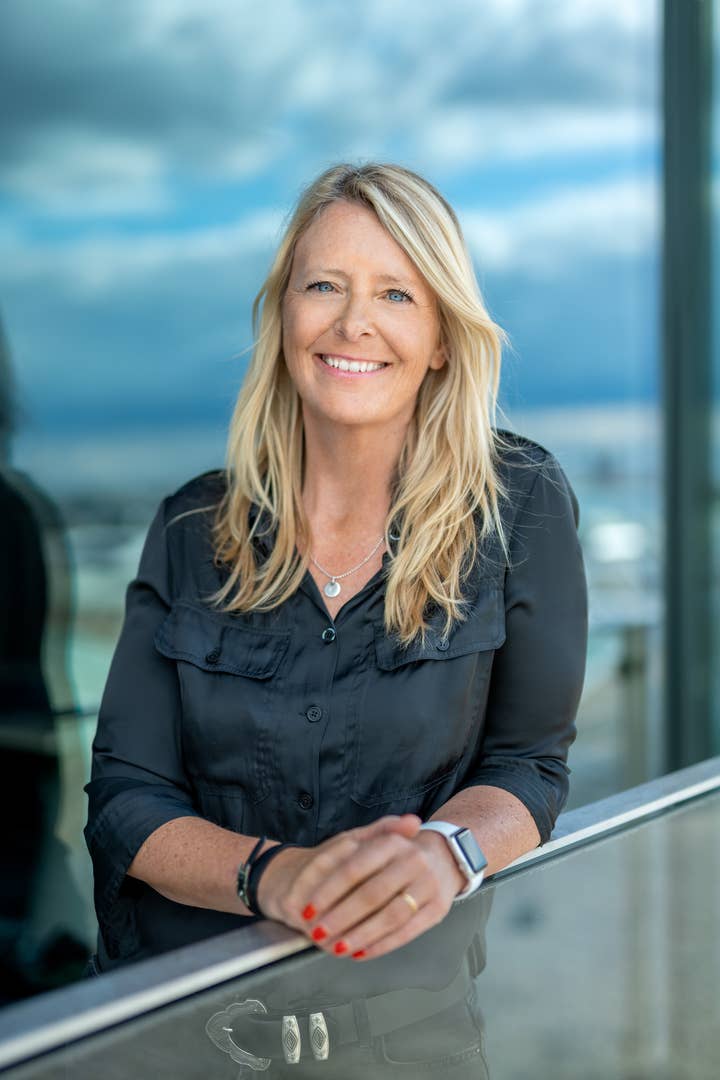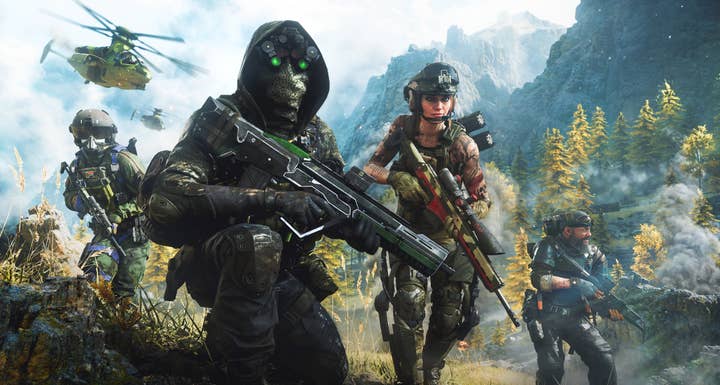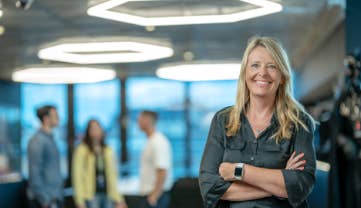"We want to be proud of Battlefield 2042"
The new head of EA DICE discusses the studio's transformation into a live service business
When Rebecka Coutaz joined the team at DICE, she walked into a company that was hurting.
The developer had just launched Battlefield 2042, the latest in the smash hit shooter franchise, to widespread disappointment. And what followed was a series of changes at the studio. Vince Zampella, the co-founder of Respawn and head of Ripple Effect studio, was placed in charge of the Battlefield series going forward. Meanwhile several leaders left DICE around the same time, including general manager Oskar Gabrielson, head of design Fawzi Mesmar, head of content Johannes Soderqvist and executive producer Aleksander Grondal.
It was during this moment of upheaval and disappointment that Coutaz joined as the new general manager.
"Things are better now," explains Coutaz in one of her first interviews since taking the job.

"The launch of Battlefield 2042 was not as expected. Our players and community were disappointed, but so was our development team. We have focused on the health of the game, and so bug after bug, patch after patch, we are fixing and improving it. And each patch we have a little, little win, and that is important for our team because they were disappointed. We're celebrating 30 years as a studio but also 20 years on Battlefield, and we have players who've been with us for 20 years and to disappoint them... it's really hard on us.
"So we want to improve the core gameplay experience and that is what we have focused on. And now, as you might know, we just released season one, and we have good feedback. The players are enjoying our map and the content that we have provided, so it's a win for us and it makes us feel better. The team is here to make Battlefield, and they're passionate about Battlefield. We have many Battlefield veterans. So it's important for us to improve Battlefield 2042 and the experience that we can provide to our players. We owe them that."
With so much change in leadership, and considering the negative reaction to 2042, it must have been tempting to draw a line under the game and simply move on. But Coutaz insists that was never an option.
"No, we couldn't do that to our players and we couldn't do that to ourselves," says Coutaz. "I don't want to use the word revenge because it's too strong in English, but you know, we cannot leave it like that. As I said, we owe it to our players."
There's more to the changes at DICE than just who is making the decisions. Despite creating some of the most popular online shooter games in the world, the studio still operates like a more traditional developer, where they create a game, update it for a bit, and move onto the next one. Today, the team is transitioning further into a live-service operation.
"We have players who've been with us for 20 years and to disappoint them... it's really hard on us"
The Battlefield series is also something that's expanding beyond DICE. The franchise has had numerous co-developers for some time. Battlefield 2042, for instance, was supported by EA Gothenburg, Criterion and Ripple Effect. Going forward, the franchise is evolving into a 'universe' or properties, with Ripple Effect, EA's new Seattle studio and mobile developer Industrial Toys all working on the IP.
Coutaz is an expert in this kind of developer. She joins following more than 10 years running Ubisoft Annecy, which is a team that has worked on multiplayer service games like Riders Republic and Steep, and is an established co-developer, having made the multiplayer modes for franchises such as Assassin's Creed and Splinter Cell. In her time, the team grew from 71 people to 340. She's knows all about managing change, and live service and co-development.
"[DICE] had four leaders who left. But that was also the opportunity to create a new leadership team around me," Coutaz says. "So there were some members that were already on the team, but we could also insert new leaders, like Lars Gustavsson, who is the studio creative director, senior producers like Andreas Morell and Ryan McArthur, who stepped up. So first we got that organised, and then we had to adapt the [Battlefield] organisation. It had been organised to ship a game, and you know that live is not the same as shipping a game. So we have looked into the organisation, to the structure, responsibility, development processes, etc. And of course including our friends at Ripple Effect, who work very closely with us on Battlefield 2042."
She continues: "When we shipped Battlefield 2042, we took a step back and together with all studios... DICE, EA Gothenburg, Criterion -- who's now on Need for Speed -- and Ripple Effect. We took a step back and we looked at what was working and then we analysed what didn't work. Why did we end up in a situation like we did and how do we fix that?
"That analysis took us a couple of months, and we are now fixing it. We're getting reorganised, restructured, improving processes, adapting them to be able to make these monster games that we are making in co-development... and also working in the hybrid model. So many learnings and the team are really behind me. They really want to change. They couldn't leave it like it was. So everybody is super motivated and we have done, in my opinion, a lot of changes in the last five to six months. It's far from perfect and we have many things still to learn, but we are integrating everything that we've learnt so far."

It's not just about learning from themselves, either. Coutaz says that working with Vince Zampella and the wider EA organisation brings some of that valuable Apex Legends experience to the team.
"On a personal level, to be able to work with people like Vince and Byron [Beede, Ripple Effect] and Marcus [Lehto, Seattle studio] and Alex [Seropian, Industrial Toys], is very inspiring. I was actually very intimidated in my first meeting with Vince, being such a great personality in the industry. They work with us on a... if not a daily basis, a weekly basis. So they're playing the game, reviewing, challenging, they are asking us sometimes very hard and very good questions. And also being in the organisation of Vince, it gives us access to the team at Apex. And to be able to share best practises with that fabulous team, it helps us to grow, to iterate, to be creative and to understand."
When it comes to the specific changes that Coutaz has made, she talks about adding new tools and processes. She says the new structure is designed to be lean and agile. All things that she admits sound like "buzz words", but that there needs to be a "very clear chain of command when we make games, and it has to be really flat and lean so that our creators can feel empowered."
"They can innovate, be creative, take risks, but fail fast, and to be able to fail fast we need to iterate, then play that game. We have worked a lot on that as well."
All of this change, while trying to fix a disappointing game, is enough for any studio to undertake during the best of times. But it's all happening while game studios are still learning to adapt to this new world of remote and hybrid working. DICE has embraced this, but like most developers, it's still learning how to make it work effectively.
"We want DICE to be the number one spot for first-person shooter games in Europe, and one of the powerhouses in the world"
"[All game developers] had to be super creative and innovative to be able to adapt to this," she says. "Today we are hybrid and that's the way we want to be in the future. Of course, we are learning everyday about things... like when one person is on Zoom and then you have two others in the meeting room, those things we are adapting to and learning [about] everyday in this hybrid model. But we are full in for it. And the beauty of it for us is that we can recruit experts from all over the world. People who have a passion for Battlefield but who didn't really want to move to Europe or didn't really want to move to Sweden, they can work for us now."
One positive of the hybrid way of working is that there's less of a division between DICE and its co-developers, with everyone working remotely on the same project.
"It also forces us to be much more structured, because the mandates have to be clear, the roles and responsibilities have to be clear and communication has to be clear. You cannot resolve things around the coffee machine."
During my chat with Coutaz I couldn't help but admire the pictures behind her from the Mirror's Edge comics. DICE may be best known for Battlefield, but it has -- from time-to-time -- worked on other projects, too. With all the talks of Battlefield, are more unusual projects like Mirror's Edge on the backburner for now?
"Totally," she says definitively. "We are only focusing on Battlefield 2042. There is no time for anything else and this is what we want to do. In three years, we want to be the first-person shooter powerhouse that DICE deserves to be, and that is what we're going for."
She concludes: "I want the team to be really proud about Battlefield 2042. That is what they are chasing and they have their heart and the passion there. We want to be really, really proud of DICE. We want DICE to be the number one spot for first-person shooter games in Europe, and one of the powerhouses in the world. It's a fabulous team. We're going to make magic together."

